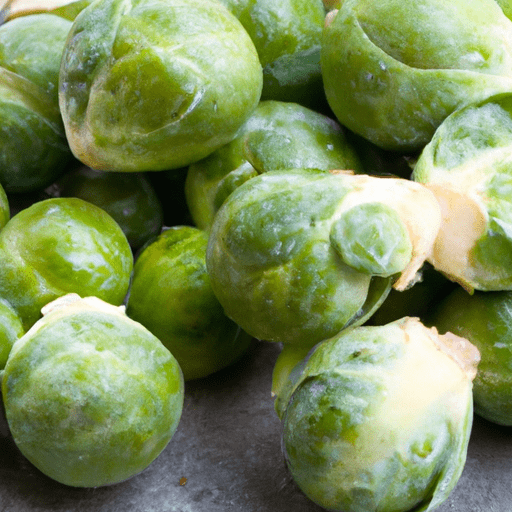The Versatile and Nutritious Brussel Sprouts
Brussel sprouts are a small but mighty vegetable that often divide opinion. Love them or hate them, these tiny cabbage-like gems have gained popularity in recent years due to their unique flavor and impressive health benefits. In this blog post, we will explore everything you need to know about brussel sprouts, from their taste profile and common uses in cooking to their nutritional value and fascinating history.
A Taste Profile That Surprises
Brussel sprouts are often described as having a distinctive and assertive flavor. When cooked properly, they have a delicate nuttiness with a hint of sweetness. However, if overcooked, they can become bitter and have an unpleasant odor. To avoid this, it’s important to cook them until they are tender but still bright green.
Common Uses in Cooking
Brussel sprouts are a versatile vegetable that can be prepared in many ways. They can be roasted, sautéed, steamed, or even enjoyed raw. Roasting brussel sprouts brings out their natural sweetness and creates a delicious caramelized exterior. Sautéing them with garlic and olive oil adds depth and enhances their flavor. Steaming is a quick and healthy way to enjoy brussel sprouts, preserving their vibrant color and firm texture.
These little green wonders also make a great addition to various dishes. They can be incorporated into stir-fries, tossed in salads, or used as a hearty side dish for roasted meats. They pair well with flavors such as bacon, balsamic vinegar, lemon, and parmesan cheese, adding complexity to any dish they are a part of.
Nutritional Powerhouses
Brussel sprouts are not only tasty but also packed with nutrients. They are an excellent source of Vitamins C and K, providing a significant portion of your daily requirements. Vitamin C is essential for a healthy immune system, while Vitamin K plays a crucial role in blood clotting and bone health.
These cruciferous vegetables are also rich in fiber, which aids in digestion and promotes a healthy gut. Additionally, they contain antioxidants that help protect against cell damage and reduce the risk of chronic diseases. Brussel sprouts are low in calories and carbs, making them a fantastic choice for those watching their weight or following a low-carb diet.
Fascinating History and Facts
Brussel sprouts are believed to have originated in ancient Rome, where they were cultivated for their medicinal properties. They gradually spread throughout Europe and gained popularity in the 16th century. Interestingly, the name “brussel sprout” comes from Brussels, Belgium, where they were widely cultivated and most likely gained culinary fame.
Contrary to popular belief, brussel sprouts do not grow on stalks like mini cabbages. Instead, they grow in clusters along a thick central stem. Each sprout is about the size of a golf ball and resembles a tiny cabbage. The British are particularly fond of brussel sprouts, with an annual tradition of serving them as part of the Christmas dinner spread.
Brussel sprouts may not be everyone’s favorite vegetable, but they certainly deserve a place on your plate. Their unique flavor, versatility in cooking, and impressive nutritional profile make them worth exploring. Whether you roast, sauté, or steam them, brussel sprouts can add depth and complexity to your meals while providing a healthy dose of vitamins and fiber. So, why not give them another chance and enjoy the many benefits these little green gems have to offer?
Brussels Sprouts
Origin: Brussels sprouts, scientifically known as Brassica oleracea var. gemmifera, were likely developed from wild cabbage plants in ancient Rome. The modern cultivation of Brussels sprouts started in Belgium during the 16th century, hence the name “Brussels” sprouts.
Common Uses: Brussels sprouts are popularly used as a vegetable in various cuisines around the world. They are commonly steamed, boiled, roasted, or sautéed as a side dish. They can also be used in stir-fries, salads, and even fermented for kimchi.
Nutritional Benefits: Brussels sprouts are highly nutritious. They are low in calories and a great source of dietary fiber, vitamins C and K, and minerals such as manganese and folate. They also contain antioxidants like kaempferol, which may have health benefits.
Unique Properties: Brussels sprouts grow as small, cabbage-like buds along the stem of the plant. They belong to the Brassicaceae family, which includes cruciferous vegetables like cabbage, broccoli, and kale. Brussels sprouts have a distinct flavor that is often described as slightly bitter, earthy, and nutty.
Historical Significance: Brussels sprouts have a long history and were cultivated in Europe since ancient times. They gained popularity in the 19th century and became a staple winter vegetable in many European countries. In recent years, Brussels sprouts have experienced a resurgence in popularity and are now commonly found in grocery stores and featured on restaurant menus.




Use the share button below if you liked it.
It makes me smile, when I see it.